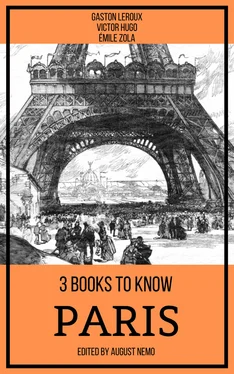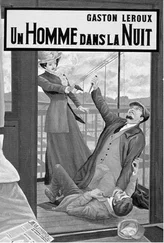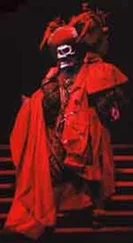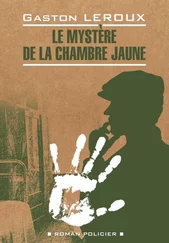The crowd clapped their hands.
“The mystery!” it repeated, “and may all the devils take Flanders!”
“We must have the mystery instantly,” resumed the student; “or else, my advice is that we should hang the bailiff of the courts, by way of a morality and a comedy.”
“Well said,” cried the people, “and let us begin the hanging with his sergeants.”
A grand acclamation followed. The four poor fellows began to turn pale, and to exchange glances. The crowd hurled itself towards them, and they already beheld the frail wooden railing, which separated them from it, giving way and bending before the pressure of the throng.
It was a critical moment.
“To the sack, to the sack!” rose the cry on all sides.
At that moment, the tapestry of the dressing-room, which we have described above, was raised, and afforded passage to a personage, the mere sight of whom suddenly stopped the crowd, and changed its wrath into curiosity as by enchantment.
“Silence! silence!”
The personage, but little reassured, and trembling in every limb, advanced to the edge of the marble table with a vast amount of bows, which, in proportion as he drew nearer, more and more resembled genuflections.
In the meanwhile, tranquillity had gradually been restored. All that remained was that slight murmur which always rises above the silence of a crowd.
“Messieurs the bourgeois,” said he, “and mesdemoiselles the bourgeoises, we shall have the honor of declaiming and representing, before his eminence, monsieur the cardinal, a very beautiful morality which has for its title, ‘The Good Judgment of Madame the Virgin Mary.’ I am to play Jupiter. His eminence is, at this moment, escorting the very honorable embassy of the Duke of Austria; which is detained, at present, listening to the harangue of monsieur the rector of the university, at the gate Baudets. As soon as his illustrious eminence, the cardinal, arrives, we will begin.”
It is certain, that nothing less than the intervention of Jupiter was required to save the four unfortunate sergeants of the bailiff of the courts. If we had the happiness of having invented this very veracious tale, and of being, in consequence, responsible for it before our Lady Criticism, it is not against us that the classic precept, Nec deus intersit, could be invoked. Moreover, the costume of Seigneur Jupiter, was very handsome, and contributed not a little towards calming the crowd, by attracting all its attention. Jupiter was clad in a coat of mail, covered with black velvet, with gilt nails; and had it not been for the rouge, and the huge red beard, each of which covered one-half of his face,—had it not been for the roll of gilded cardboard, spangled, and all bristling with strips of tinsel, which he held in his hand, and in which the eyes of the initiated easily recognized thunderbolts,—had not his feet been flesh-colored, and banded with ribbons in Greek fashion, he might have borne comparison, so far as the severity of his mien was concerned, with a Breton archer from the guard of Monsieur de Berry.
CHAPTER II. PIERRE GRINGOIRE.
––––––––

NEVERTHELESS, AS BE harangued them, the satisfaction and admiration unanimously excited by his costume were dissipated by his words; and when he reached that untoward conclusion: “As soon as his illustrious eminence, the cardinal, arrives, we will begin,” his voice was drowned in a thunder of hooting.
“Begin instantly! The mystery! the mystery immediately!” shrieked the people. And above all the voices, that of Johannes de Molendino was audible, piercing the uproar like the fife’s derisive serenade: “Commence instantly!” yelped the scholar.
“Down with Jupiter and the Cardinal de Bourbon!” vociferated Robin Poussepain and the other clerks perched in the window.
“The morality this very instant!” repeated the crowd; “this very instant! the sack and the rope for the comedians, and the cardinal!”
Poor Jupiter, haggard, frightened, pale beneath his rouge, dropped his thunderbolt, took his cap in his hand; then he bowed and trembled and stammered: “His eminence—the ambassadors—Madame Marguerite of Flanders—.” He did not know what to say. In truth, he was afraid of being hung.
Hung by the populace for waiting, hung by the cardinal for not having waited, he saw between the two dilemmas only an abyss; that is to say, a gallows.
Luckily, some one came to rescue him from his embarrassment, and assume the responsibility.
An individual who was standing beyond the railing, in the free space around the marble table, and whom no one had yet caught sight of, since his long, thin body was completely sheltered from every visual ray by the diameter of the pillar against which he was leaning; this individual, we say, tall, gaunt, pallid, blond, still young, although already wrinkled about the brow and cheeks, with brilliant eyes and a smiling mouth, clad in garments of black serge, worn and shining with age, approached the marble table, and made a sign to the poor sufferer. But the other was so confused that he did not see him. The new comer advanced another step.
“Jupiter,” said he, “my dear Jupiter!”
The other did not hear.
At last, the tall blond, driven out of patience, shrieked almost in his face,—
“Michel Giborne!”
“Who calls me?” said Jupiter, as though awakened with a start.
“I,” replied the person clad in black.
“Ah!” said Jupiter.
“Begin at once,” went on the other. “Satisfy the populace; I undertake to appease the bailiff, who will appease monsieur the cardinal.”
Jupiter breathed once more.
“Messeigneurs the bourgeois,” he cried, at the top of his lungs to the crowd, which continued to hoot him, “we are going to begin at once.”
“Evoe Jupiter! Plaudite cives! All hail, Jupiter! Applaud, citizens!” shouted the scholars.
“Noel! Noel! good, good,” shouted the people.
The hand clapping was deafening, and Jupiter had already withdrawn under his tapestry, while the hall still trembled with acclamations.
In the meanwhile, the personage who had so magically turned the tempest into dead calm, as our old and dear Corneille puts it, had modestly retreated to the half-shadow of his pillar, and would, no doubt, have remained invisible there, motionless, and mute as before, had he not been plucked by the sleeve by two young women, who, standing in the front row of the spectators, had noticed his colloquy with Michel Giborne-Jupiter.
“Master,” said one of them, making him a sign to approach. “Hold your tongue, my dear Liénarde,” said her neighbor, pretty, fresh, and very brave, in consequence of being dressed up in her best attire. “He is not a clerk, he is a layman; you must not say master to him, but messire.”
“Messire,” said Liénarde.
The stranger approached the railing.
“What would you have of me, damsels?” he asked, with alacrity.
“Oh! nothing,” replied Liénarde, in great confusion; “it is my neighbor, Gisquette la Gencienne, who wishes to speak with you.”
“Not so,” replied Gisquette, blushing; “it was Liénarde who called you master; I only told her to say messire.”
The two young girls dropped their eyes. The man, who asked nothing better than to enter into conversation, looked at them with a smile.
“So you have nothing to say to me, damsels?”
“Oh! nothing at all,” replied Gisquette.
“Nothing,” said Liénarde.
The tall, light-haired young man retreated a step; but the two curious maidens had no mind to let slip their prize.
Читать дальше










